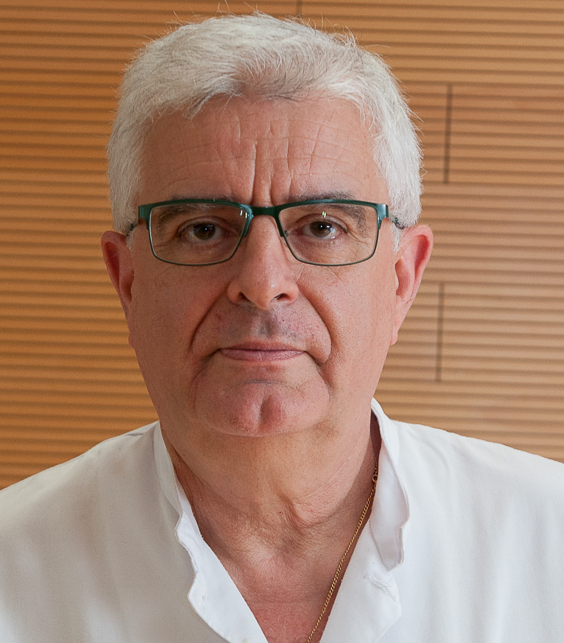touchEXPERT OPINIONS Implementing optimal stewardship strategies to combat antibiotic resistance
Leading infection control experts explore multidisciplinary strategies for antimicrobial stewardship and new and emerging agents to combat
multidrug-resistant microbes.
Dr Esmita Charani outlines how the multidisciplinary teams should function to promote antimicrobial stewardship, and provides guidance for developing antimicrobial stewardship programmes.
1/3 Next Interviewn this interview, Dr Esmita Charani answers the following questions:
- Why is a multidisciplinary team approach needed for antimicrobial stewardship?
- What do you think best practice should be for communication between clinicians so the MDT operates effectively?
- How can clinicians in different countries with different cultures and resources implement an MDT approach to combat AMR?
- How can antimicrobial stewardship experts in higher-income and lower- and middle-income countries collaborate to address antimicrobial resistance?
Dr Charani is the Research Lead for Practice, Design and Engineering at the NIHR Health Protection Research Unit for Healthcare Associated Infections and Antimicrobial Resistance within the faculty of Medicine at Imperial College London, UK. read more
Dr Charani is also an honorary Associate Professor at the University of Cape Town, South Africa, a visiting Researcher at Haukeland University Hospital, Bergen, Norway, and an Adjunct Professor at Amrita Institute of Medical Sciences, Kerala, India, where she is involved in helping to implement and investigate national antibiotic stewardship programmes.
Dr Charani’s work in antimicrobial resistance (AMR) has been recognized through the Academy of Medical Sciences UK–India AMR Visiting Professor award. She is an expert advisor to the Commonwealth Pharmacy Association and a Global Health Fellow with the Office of Chief Pharmaceutical Officer, England. She is involved in mentoring and supporting clinical pharmacists across different healthcare settings and economies in implementing antimicrobial stewardship interventions.
Dr Esmita Charani discloses: Speakers bureau fees from Merck Sharp & Dohme.
Prof. Antoni Torres discusses current clinical practice for antimicrobial therapy, including diagnosis, choice of therapy and how to monitor patients receiving antimicrobial therapy.
2/3 Next InterviewIn this interview, Prof. Antoni Torres answers the following questions:
- What approach should be used for diagnosing microbial infections?
- What criteria should clinicians use to select the most appropriate antimicrobial treatment?
- When initiating antimicrobial treatment, what factors should be considered to ensure it is appropriate for the individual patient?
- How should patients receiving antimicrobial treatment be monitored?
Prof. Antoni Torres is a Professor of Pulmonology and Critical Care at the University of Barcelona, Spain. read more
Prof. Torres is considered a physician of reference both nationally and internationally in lung infections, including pneumonia, chronic obstructive pulmonary disease (COPD), bronchiectasis, immunocompromised patients, weaning, noninvasive ventilation (NIV) and acute respiratory distress syndrome (ARDS-ALI). He leads the research group on management and prevention of infectious, interstitial and tumoural lung diseases of the August Pi i Sunyer Institute of Biomedical Research (IDIBAPS), from where he facilitates translational research studies.
Prof. Torres has taken part in many research projects as principal researcher of the Health Research Fund (FIS). His research receives support from many public bodies, including: Carlos III Health Institute (ISCII), CibeRes, IDIBAPS and the European Union. He is currently involved in more than 30 national, European and other international projects. He coordinates a CIBER group on respiratory diseases (CibeRes), and takes part in the European projects, GRACE, MOSAR (WP3, WP4) and Theraedge.
Prof. Antoni Torres discloses: Consulting fees from Jansen, Merck Sharp & Dohme, OM Pharma, Pfizer and Polyphor.
Prof. Martin-Loeches analyses the new and emerging options for antimicrobial therapy, and provides guidance on how they can be incorporated into daily clinical practice.
3/3 Take CE/CME TestIn this interview, Prof. Ignacio Martin-Loeches answers the following questions:
- Why are new management options for antibiotic-resistant infections needed?
- What data support the use of new non-β-lactamase inhibitor therapies for addressing antibiotic-resistant infections?
- What is the potential role for β-lactamase inhibitors in treating antibiotic-resistant infections?
- How can clinicians incorporate new and emerging therapies into their daily clinical practice?
Prof. Ignacio Martin-Loeches is a full-time Consultant in Intensive Care Medicine at St James’s Hospital, and Professor at Trinity College, Dublin, Ireland. read more
Prof. Martin-Loeches is the chair of CoBaTrICE (International Competency Based Training programme in Intensive Care Medicine for Europe and other world regions) under the European Society of Intensive Care Medicine (ESICM), and elected council member of the World Federation of Societies of Intensive and Critical Care Medicine.
Prof. Martin-Loeches is part of the steering committee and an executive member of the research-working group of the Surviving Sepsis Campaign (SSC). He is the secretary of the Acute Critical Care Group at the European Respiratory Society (ERS).
He is principal investigator of European Regional Development Funds (ERDF), Science Foundation Ireland (SFI) grants and the European Network for ICU-related infections (ENIRRIs) under the European Respiratory Society (ERS). He has published over 300 manuscripts with over 10,000 citations and his H index is 53.
Prof. Ignacio Martin-Loeches discloses: Advisory board fees from Gilead, Merck Sharp & Dohme, and Pfizer.
Overview & Learning Objectives
Overview
In this activity, the expert faculty review how to implement antimicrobial stewardship policies, the use of current antibiotics within the context of antimicrobial stewardship, and the new and emerging agents that will help combat multidrug-resistant pathogens.
This activity is jointly provided by USF Health and touchIME. read more
Target Audience
This activity has been designed to meet the educational needs of urologists, pulmonologists, hospital pharmacists, infectious disease specialists and primary care physicians involved in infection control and the treatment of antimicrobial disease.
Disclosures
USF Health adheres to the Standards for Integrity and Independence in Accredited Continuing Education.
All individuals in a position to influence content have disclosed to USF Health any financial relationship with an ineligible organization. USF Health has reviewed and mitigated all relevant financial relationships related to the content of the activity. The relevant relationships are listed below. All individuals not listed have no relevant financial relationships.
Faculty
Dr Esmita Charani discloses: Speakers bureau fees from Merck Sharp & Dohme.
Prof. Antoni Torres discloses: Consulting fees from Jansen, Merck Sharp & Dohme, OM Pharma, Pfizer and Polyphor.
Prof. Ignacio Martin-Loeches discloses: Advisory board fees from Gilead, Merck Sharp & Dohme, and Pfizer.
Content reviewer
Jamie P Morano, MD, MPH, FACP, FIDSA, Associate Professor, Morsani College of Medicine and College of Public Health University of South Florida, USA has no financial interests/relationships or affiliations in relation to this activity.
Touch Medical Director
Alison Scott has no financial interests/relationships or affiliations in relation to this activity.
USF Health Office of Continuing Professional Development and touchIME staff have no financial interests/relationships or affiliations in relation to this activity.
Requirements for Successful Completion
In order to receive credit for this activity, participants must review the content and complete the post-test and evaluation form. Statements of credit are awarded upon successful completion of the post-test and evaluation form.
If you have questions regarding credit please contact cpdsupport@usf.edu
Accreditations
Physicians
This activity has been planned and implemented in accordance with the accreditation requirements and policies of the Accreditation Council for Continuing Medical Education (ACCME) through a joint providership of USF Health and touchIME. USF Health is accredited by the ACCME to provide continuing medical education for physicians.
USF Health designates this enduring material for a maximum of 0.75 AMA PRA Category 1 CreditTM. Physicians should claim only the credit commensurate with the extent of their participation in the activity.
The European Union of Medical Specialists (UEMS) – European Accreditation Council for Continuing Medical Education (EACCME) has an agreement of mutual recognition of continuing medical education (CME) credit with the American Medical Association (AMA). European physicians interested in converting AMA PRA Category 1 CreditTM into European CME credit (ECMEC) should contact the UEMS (www.uems.eu)
Advanced Practice Providers
Physician Assistants may claim a maximum of 0.75 Category 1 credits for completing this activity. NCCPA accepts AMA PRA Category 1 CreditTM from organizations accredited by ACCME or a recognized state medical society.
The AANPCP accepts certificates of participation for educational activities approved for AMA PRA Category 1 CreditTM by ACCME-accredited providers. APRNs who participate will receive a certificate of completion commensurate with the extent of their participation.
Date of original release: 24 February 2022. Date credits expire: 24 February 2022.
If you have any questions regarding credit please contact cpdsupport@usf.edu
Learning Objectives
After watching this activity, participants should be better able to:
- Analyse the importance of a multidisciplinary approach to patient care in the management of antibiotic resistance
- Evaluate how current guidelines direct individualized patient care for antibiotic-resistant infections
- Discuss the practical use of new and emerging management options for antibiotic-resistant infections

Register to touchRESPIRATORY for FREE
- Peer-reviewed journals and expert opinions
- Interactive CME and e-learning modules
- Video conference highlights



